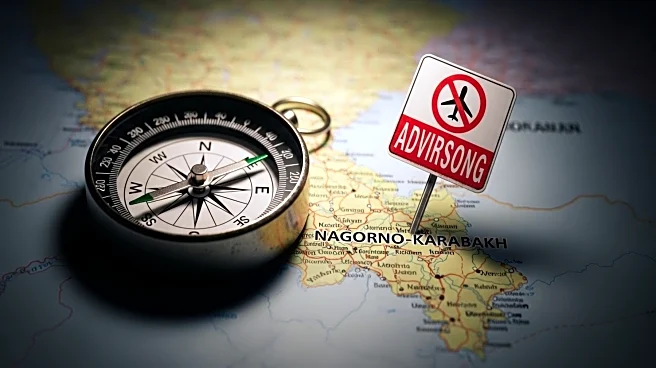What is the story about?
What's Happening?
Avi Rosenfeld, a 19-year-old traveler, recently visited Nagorno-Karabakh, a region known for its high risk of land mines and military tensions. The U.S. State Department has designated this area, particularly the border with Armenia, as a 'Do Not Travel' zone due to these risks. Rosenfeld's journey was part of a rare tour organized by the Azerbaijani government, allowing a small group of foreign travelers to enter the region. The area, under Azerbaijani control, remains heavily mined and is considered one of the most dangerous places in the world. Despite the risks, Rosenfeld, who holds British and Swiss passports, joined the tour for the adventure, traveling with military and police escorts.
Why It's Important?
The U.S. State Department's travel advisory highlights the ongoing geopolitical tensions in the Nagorno-Karabakh region, which have implications for international relations and regional stability. The area has been a point of conflict between Armenia and Azerbaijan, with recent military campaigns by Azerbaijan to assert control. The presence of land mines and military convoys underscores the region's volatility, posing significant risks to travelers and complicating efforts for peace and reconstruction. The situation affects not only local populations but also international stakeholders, including governments and humanitarian organizations, who are concerned about safety and human rights in the region.
What's Next?
The Azerbaijani government is attempting to rebrand Nagorno-Karabakh as a potential tourist destination, investing in infrastructure to attract visitors. However, Western travel advisories remain severe, and the region's status as a closed military zone limits civilian access. Future developments will depend on the geopolitical climate and efforts to clear land mines and stabilize the area. International observers and governments will likely continue to monitor the situation closely, assessing the implications for regional security and diplomatic relations.
Beyond the Headlines
The visit by foreign travelers, including Rosenfeld, to Nagorno-Karabakh raises questions about the ethics of tourism in conflict zones. While such trips can provide unique insights and promote understanding, they also risk normalizing or trivializing the dangers and suffering experienced by local populations. The Azerbaijani government's efforts to promote tourism may be seen as a strategy to legitimize its control over the region, which remains a contentious issue in international diplomacy.















